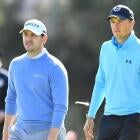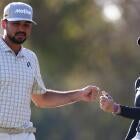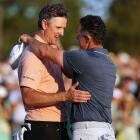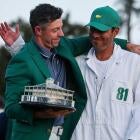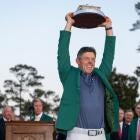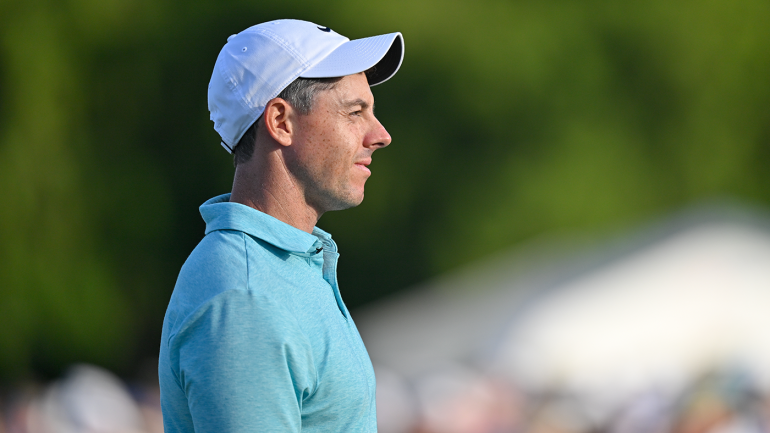
LOS ANGELES -- The punishing reality of being generationally great at golf is cruel at its core and unusual in its delivery. Major championship margins are often so thin that it's impossible to understand how anyone wins at all.
Wyndham Clark won the 2023 U.S. Open at Los Angeles Country Club by one stroke over Rory McIlroy.
That's one way to say it. The other? Rory McIlroy lost the 2023 U.S. Open at Los Angeles Country Club by one stroke to Wyndham Clark.
It was McIlroy's 33rd consecutive miss at the four biggest tournaments in the world but almost certainly the closest call he's had since the 2014 PGA Championship at Valhalla. It was -- if you add up everything that could have gone differently -- about as close as you can come to winning a major championship without it actually happening.
First things first, Clark was tremendous. He hit some bad boy shots in gruesome emotional conditions that will gnarl even the most hardened individual's innards. Two stand out. The twirling missile he hit Saturday evening in the dark to erase a bogey at the 17th with a birdie at the last. It never left the flag, and he reacted like it wouldn't. It put him into the final pairing Sunday where he took the U.S. Open. It was a badass moment for somebody who may be on his way to becoming a star.
💀 💀 💀 pic.twitter.com/uQFEDh1EAJ
— Kyle Porter (@KylePorterCBS) June 18, 2023
The second came Sunday afternoon as the tournament lingered in that mysterious and nervous place where it is neither put away nor completely in the balance, the place where 154 golfers have taken both hands off the silver but two are still kind of holding on. McIlroy had just bogeyed the 14th after benefitting from the break of the tournament when his third shot embedded in the grass above the bunker. He received a drop, but in a true "ball don't lie" situation, he proceeded to make 6.
As he stepped to the 15th tee -- mere feet from the 16th green -- Clark hit a shot from 282 yards through an 8-yard corridor to 20 feet from the cup. It ended up being a two-shot swing that was a dart to Rory's heart. The tournament flipped in that moment, and Rory never got it back.
First the twirl on Saturday, now this. Wyndham Clark clearly loves the moment. Shot of the event (maybe the season). pic.twitter.com/Mmrnv6Gr02
— Kyle Porter (@KylePorterCBS) June 19, 2023
It was what major championship-winning shots are supposed to look like, and the feel among the fans on the grounds at LACC was that the tournament was over. But it wasn't. Clark bogeyed the next two, and Rory got it to the house at 9 under. Clark needed 4 at the last to win his first major. He lagged a 60-foot putt to mere inches and all that was left was the roar.
"You don't want to wish bad on anyone, but you're really hoping for a three-putt," said McIlroy after watching Clark sweep his hope away. "You're hoping to somehow get into a playoff to keep giving yourself a chance. You're rooting for one guy and that guy is yourself at that point. Yeah, I guess you're just hoping for the other guy to slip up or make a mistake or give you a glimmer of hope. Wyndham was pretty much rock solid all day, and that was a great two-putt at the last."
Clark has remade his game, revamped his iron play and turned himself into another swaggering 20-something American major winner, not to mention a top 15 player and somebody who will almost certainly be on the U.S. Ryder Cup team this fall. He wanted the ball when the air got thin, and he delivered over and over and over until the USGA put a trophy in his hands.
While his story and that performance were terrific, it was hard to turn away from McIlroy. Even as Clark came up the last, yelps for Rory came from a crowd that circled the 18th green. It was not St. Andrews from last July where every man, woman and child would have thrown themselves in front of Cameron Smith just to give Rory one more chance, but it was pretty close.
It makes sense. In a mostly post-Tiger Woods world, there's no bigger star and no more famous figure than the kid from Holywood, County Down, Northern Ireland. When you throw in the fact that he put the PGA Tour on his back over the last year and tried to turn the tide on an overwhelming force in the world of golf, and it's easy to see that Rory is the sun in golf around which ever planet revolves.
His success at the four most important events, however, has been a black hole.
Major championship math is perverse, even for the greats. You have to shoot such ridiculous scores, beat such incredible players, receive such astonishing luck. Woods has lost 84% of the majors he's played throughout his career. Tom Watson lost 94% of his. Arnold Palmer checks in at 95%. These are some of the greatest champions in history, and they almost never win.
After winning four of his first 24 majors as a professional, McIlroy has experienced a Saharan drought in the middle of his career. At age 25, after taking two titles in the summer of 2014, he had the ball on a string and the world by the tail with opportunities as endless as the summer sun.
But despite 19 (nineteen!) top 10s in his last 33 major starts, he still has not won his fifth. And the way he's lost and the players to whom he's lost? Well, it is certainly the cruel, beautiful game.
You could make the case that, of the 33 chances he's had since that PGA, this one and last year's Open Championship loss to Smith (who came roaring around the final turn) are the two best chances he's squandered.
How close was this one?
Consider this: McIlroy and Clark took 206 strokes from Friday-Sunday. They shot the exact same score over the last 54 holes. On Thursday, however, Clark got the four-time champion by one. Can you think of anywhere McIlroy could have made up a stroke? How about on the 18th green in Round 1 when he completely whiffed his third shot?
What about on Sunday, trailing Clark by one at the par-5 14th, when Rory stepped into his third shot. Even in the moment, it felt mighty consequential. He left it short of the green where it embedded, and he made his only bogey of the day. Making bogey is nothing special. There were plenty of those made by everyone throughout the week.
However, Rory's explanation of what happened: "I hit it when the wind was at its strongest and the ball just got hit a lot by the wind, and obviously it came up short. If I had it back, I think I had the right club and the right shot. I might have just had to wait an extra 15 or 20 seconds to let that little gust settle."
He's waited nine years for another title. If he'd waited 15 more seconds, perhaps he'd have one. The margins are shocking, almost harrowingly, thin. As a peer suggested after McIlroy narrowly missed one of what felt like a thousand putts on Sunday, "These guys must all be in therapy."
After his round, Rory and Rickie Fowler -- the 54-hole co-leader who had played alongside Clark in the final pairing and shot a tough 75 to lose by five -- hugged just outside the white tent where they spoke with those who asked what it feels like to lose. They compared notes about their days, spoke about the speed of LACC's greens, and at the end, Rory palmed the back of Rickie's head as they shared a quick embrace.
It was emblematic of McIlroy's grace in defeat, and he was more upbeat than expected.
He spoke about the next major and said the countdown to The Open at Royal Liverpool started "3 minutes ago." He also immediately put one of the toughest losses of his career into perfect perspective.
"When I do finally win this next major, it's going to be really, really sweet," McIlroy said. "I would go through 100 Sundays like this to get my hands on another major championship."
How is this his response to such tremendous heartbreak?
There is an irony in being so great and failing so much. Do major championship losses hurt for Brian Harman (two top 10s in 29 starts)? Do they hurt for Adam Hadwin (one top 10 in 22 starts)?
Perhaps, but I have my doubts.
They certainly don't hurt like this one -- a West Coast major in L.A. that he had circled for a while -- hurt Rory. The closer you get, the more difficult it becomes to accept that you were still too far away.
In the award-winning musical "La La Land," there is a scene where Emma Stone's character, Mia, stands at an emotional audition for a role she's desperate to land. When asked to deliver the goods, she slips into a song about about her life. The chorus is equal parts sorrowful and aspirational. You could probably find songs that describe the desolation and desperation of the arc of life better, but you could also find a million that do it worse. Here's what she sang.
Here's to the ones who dream
Foolish as they may seem
Here's to the hearts that ache
Here's to the mess we make
It takes a total fool to believe you're going to win a major. The numbers never work. You whiff a shot on Thursday. You get a gust on Sunday. You miss a putt or eight of them in between. It's not as astonishing to me that Brooks Koepka has won five of these or McIlroy has won four as it is that anyone ever wins one at all.
And when you tick several off when you're 25 years old, the emotional weight of expectation when you rip off an 0-for-33 stretch in the meat grinder of professional golf can indeed be crippling. Look no further than Jordan Spieth and Collin Morikawa, both of whom won early and often but have displayed outbursts in recent years incongruent with who and what we considered them to be. The weight of expectation is heavier than it seems.
It is a world built specifically to callous one's heart and dampen one's dreams, but Rory has somehow safeguarded his joy for the game at the highest level ... and perhaps even seen it grow. The preservation of these dreams is part of what has made him great, and it is what will -- if it happens -- fuel his next major title.
Dreams can turn into nightmares, of course, and Rory has never been shy about putting his heart in the line of fire. Over the last 18 months, he has crusaded for a future of professional golf that he believed was best. The rug got yanked from under him last week at the Canadian Open, but he did not have regrets.
Publicly, he took the arrows with grace. Privately, he reminded himself and others that no matter what the future holds, everything is going to be OK. We're living our dreams, he explained, how could you not delight in that.
McIlroy has not been exempt from on-course devastation, either. When he co-led after 54 holes at St. Andrews last summer, it seemed almost a foregone conclusion that the most important person in golf at that time would clutch its most historically important prize, a Claret Jug at The Old Course. That day, of course, ended with 36 putts and a golf cart ride with his wife, Erica, in which Rory buried his face in her shoulder and didn't come up for air.
"La La Land" is one of McIlroy's favorite films. He has said he cries almost every time he watches it. This is not surprising for romantics love art and nothing invigorates our emotions quite like the passage of time.
Time has passed for Rory, too; he is not who he once was. The 25-year-old wunderkind is gone, and he's never coming back. As with all wunderkinds, you wonder how something so obvious and tangible could seemingly disappear in an instant. He's different now, 34 years old and in the second half of the heart of his career. That must weigh on him. Every missed major is another sliding door.
But he keeps showing up. He keeps putting himself on the line. He, like everyone who would love to see it happen, is ready to get hurt. Because getting hurt means you're still dreaming, and dreaming means you're still living. What better way to live than to risk your heart for the sake of something that matters?
"I've been trying and I've come close over the past nine years or whatever it is, and I keep coming back," McIlroy said earlier in the week. "I feel like I've showed a lot of resilience in my career, a lot of ups and downs, and I keep coming back. And whether that means that I get rewarded or I get punched in the gut or whatever it is, I'll always keep coming back."
It's not the coming back that's the point, though, for anyone can simply show up. It's the reentering with purpose, and like Fowler noted Saturday night, not being scared of the outcome.
If the cost of ambition is the burden of failure then that's far too high a price for most rational adults to pay.
And then there are the fools who dream.
Along this 33-mile road of empty frustration and unfulfilling endings, Rory learned something that few ever internalize. At the end of the day, trophies and records and glory will fade. What remains is the enduring truth that who you become matters far more than what you could ever possibly achieve, and not just because the former informs the latter.
Perhaps more important than all of the accolades or even the closest of calls is that after all these years, all those shots, all that tremendous failure is that one north star has prevailed in the four-time major champion's life.
Rory McIlroy remains foolish enough to dream.
![[object Object] Logo](https://sportshub.cbsistatic.com/i/2020/04/22/e9ceb731-8b3f-4c60-98fe-090ab66a2997/screen-shot-2020-04-22-at-11-04-56-am.png)










